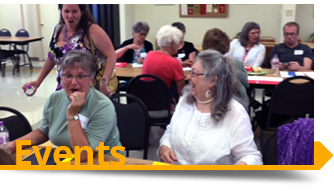ELCA World Hunger Gathering by Frances Dobbs, LOPPW Hunger Advocacy Fellow
I attended the ELCA World Hunger Leadership Gathering for the first time this year. Going into the gathering, I was haunted by a verse, “For you always have the poor with you” (Matthew 26:11). Perhaps for many advocates, this message can be chilling. It has been 50 years of ELCA World Hunger, and at this anniversary there were many generations of people who had been involved. Some remember several gatherings and have seen the evolution of their work, some had gone to a couple gatherings, and others like me are new. After all these years, there are still many to feed, and the task to fill that need seems daunting.
In relation to talking about tasks, I was struck by a speaker who talked about the concept of Diakonia. It is found in the Gospel of Mark: “for the Son of Man came not to be served but to serve and to give his life a ransom for many” (10:45). It is this word “serve” that is the English translation of Diakonia. The term described the ministries of the early church who helped the poor, pooled their resources, and helped the outcasts of society. As I learned, it is a term often used by World Hunger to describe their hunger ministry efforts. The speaker discussed her experience working with World Hunger in Brazil with indigenous communities. There have been times in which the church’s use of the term service has come across as patronizing to indigenous communities and the speaker led a discussion on how to resolve this tension given both the call in the Gospels to serve but also the fraught history of indigenous people being forced to serve against their will. Throughout the weekend, there were explorations of tensions in the church’s work in approaching different communities while seeking to work to have people’s basic needs met.
An interesting intersection present at the conference was that between hunger and immigration. One ministry of the ELCA, Accompanying Migrant Minors with Protection, Advocacy, Representation and Opportunities (AMMPARO), was present at the event and there were various opportunities to learn more about immigration and how the U.S.’s system often fails in its delivery to welcome the stranger. One day, I attended an outing to an ELCA congregation called St. James. Filled with imagery of Our Lady of Guatelupe, I must admit I felt very at home as a Catholic at the church. The community shared their ministries to provide legal services, rental assistance, and English second Language (ESL) classes. A pro-bono lawyer spoke about his work with clients and the broad scope of inefficiencies and inadequacies in the legal system to help people get their legal status in a timely manner. He explained how human relationships often determine the pace and outcome of asylum claims, applications for green cards, or other documented statuses. In one example, he explained that for those sponsoring a sibling from Mexico, the cases were backlogged to 2001 according to the visa bulletin. Thus, when he hears people, especially lawmakers, complain that migrants should simply “get in line”, he asks them “what line?”.
There are many groups both in the ELCA and the church’s partners that have done great work in areas related to hunger and poverty. A lot of hope was shared in the stories of speakers and participants alike in using one’s gifts to help solve this problem. Yet, going back to the previously mentioned verse in Matthew, there can be a lot of sorrow in seeing goals like hunger eradication unfulfilled. In my view, it always comes back to remembering the person of Christ, our savior who emptied Himself to be incarnate and most likely worked as a carpenter with His father Joseph. Jesus performed His ministry work for 3 years. Many problems in the world like hunger and poverty continued to exist after His ascension. Likewise, hunger still continues to plague the world after 50 years of ELCA World Hunger. God gave us the Holy Spirit to continue the mission Christ gave us–to feed the hungry, welcome the stranger, protect the vulnerable, and visit the incarcerated. Our God who died on a cross and was resurrected continues to breathe new life into His church and its ministries. There is not an easy solution to the fact that our work is yet to be completed, but we can continue to cooperate with God’s grace to build His kingdom here–where all are to have a seat at the table and be fed.



